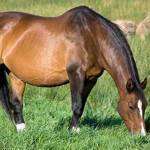Using Mature Hay for Broodmare Bedding: Potential for Tall Fescue Toxicity

A reminder for owners of late-pregnant mares: be careful when using hay for bedding in broodmare stalls. Last summer’s drought conditions in many areas have resulted in high prices for straw, a traditional favorite for broodmare bedding, and some farm owners have opted for using poor-quality hay mowed from overmature pastures, or even last year’s leftover hay, for the same purpose. The danger in this practice is that hay may contain endophyte-infected tall fescue, and mares that nibble their bedding could ingest enough toxin to cause serious problems during the last trimester of pregnancy.
Surveys have shown that horse pastures in Kentucky’s central Bluegrass area, a region noted for its high concentration of horse farms, often contain more than 25% tall fescue. In other areas of Kentucky and in surrounding states, tall fescue often makes up more than 50% of horse pastures. Virtually all of these plants, which were originally selected for pasture seeding because of their hardiness and strong growth habits, contain ergovaline, a toxin. The stems and seed heads contain the highest levels of ergovaline, and these plant parts are still dangerous even after they have been cut, dried, and baled into hay. An ergovaline level of more than 200 parts per billion can cause fescue toxicity in pregnant mares.
While geldings and barren mares are not harmed by ingesting ergovaline, late-pregnant mares who eat contaminated fescue hay are likely to show signs of toxicity such as longer pregnancies, thick and tough placentas that don’t break at foaling (red bag), and a lack of normal milk production. To diminish the risk, taking mares off fescue pastures during the last trimester of pregnancy is advised, but inadvertent exposure through hay or bedding negates the advantage of this management step.
Farm managers who are considering using overmature grass hay as bedding are advised to have hay samples tested for ergovaline concentration to ensure that it is safe for pregnant mares. Hay samples should be taken by using a hay probe to collect cores from five to ten bales in each cutting or batch of hay. You may be able to borrow a hay probe from a county agricultural extension agent, feed mill, or farm product dealer.
For farms in central Kentucky, a representative from the Pasture Evaluation Program will come to your farm, sample your hay, submit it to the University of Kentucky Veterinary Diagnostic Laboratory (UKVDL), and send the results with an nterpretation. The cost of the ergovaline test is $50 per sample. Veterinarians and county agricultural extension agents can suggest other testing sites. For more information about the testing procedure, call the clinical veterinary toxicologist at the UKVDL at 859-257-7912 or go here: Testing Hay for Ergovaline.








